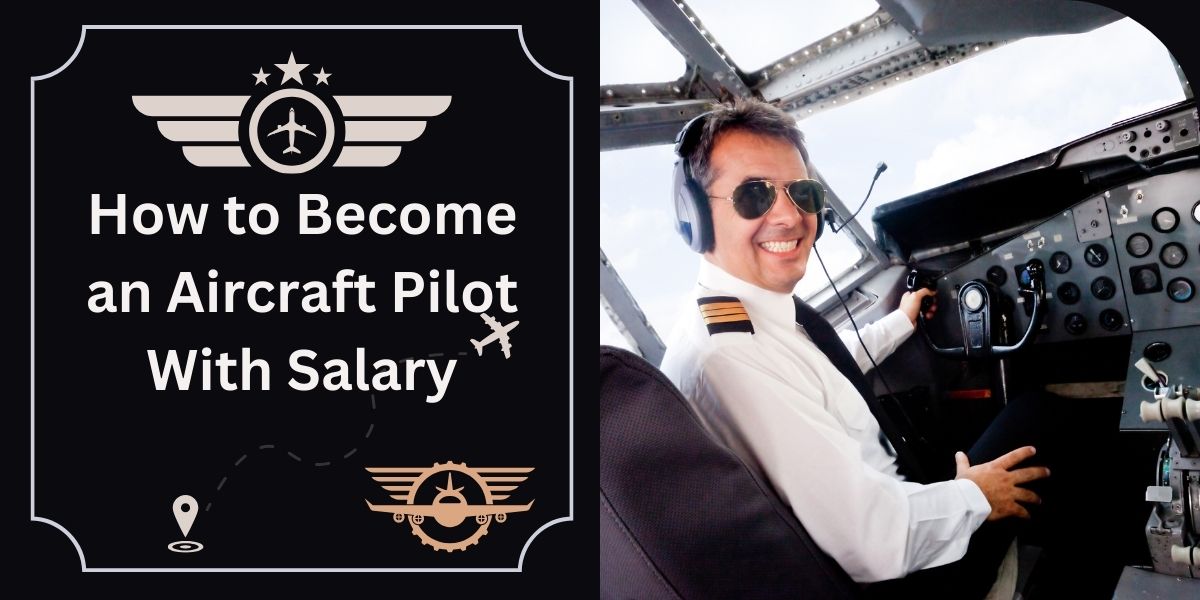Embarking on the path to becoming an aircraft pilot in the aviation industry is an exciting journey that demands commitment and passion.
A pilot operates an aircraft to transport people and goods. Typically, a pilot works together with a co-pilot and shares the responsibilities of steering the plane, navigating, and communicating with air traffic control and monitoring instruments.
In this article, we will discuss how to become an aircraft pilot and their average salary.
What does an aircraft pilot do?
An aircraft pilot is responsible for flying passengers and other cabin crew members from one destination to another. They are required to navigate the flight path of the aircraft using specialized equipment and control all other aspects of the plane’s movement.
In the cockpit, the captain (pilot in command) and the first officer (second in command) work as a team to ensure a safe flight, from vehicle inspection and flight logs to precise coordination for takeoff and landing.
Aircraft pilots operate multi-engine aircraft, which requires a great deal of technical knowledge. They are responsible for handling the plane through inclement weather and must react to any mechanical problems that occur while in flight. Aircraft pilots have to communicate with air traffic controllers and use radar to understand their flight path.
How to Become an Aircraft Pilot
To become an aircraft pilot, these steps outline the most common path to complete the proper training and gain experience:
1. Earn an FAA-approved bachelor’s degree
Most major airline companies require a bachelor’s degree in aviation or a related field when applying for jobs as an airline pilot.
If you plan to follow an aircraft pilot career path, the most common step students take is to go to an FAA-authorized institution where they will take aviation-related coursework to earn a degree and receive pilot training at the same time.
This path can help guide you directly to your end goal of becoming an airline pilot. An important benefit of attending an FAA-approved college or university is the pilot training that is usually included as part of their aviation program.
They can provide students with a wide variety of training aids, dedicated facilities, and more flexibility in scheduling flight hours.
2. Obtain a private pilot license
To earn a private pilot certificate or pilot’s license, you’ll need to learn basic flight methods, aircraft maneuvers, navigation, flight planning, and emergency training.
Once you have this certification, you are legally allowed to fly a plane. Pilots earning this certificate learn to fly small aircraft on their own.
3. Acquire an instrument rating
Flying for an airline requires reading and using instruments. Once you earn a basic pilot certificate, you’ll need to train to use sophisticated instruments that guide a plane through different weather conditions and altitudes.
This certification also teaches pilots to interact with air traffic control and the National Airspace System.
4. Obtain a commercial pilot license
A commercial pilot license allows pilots to fly goods or people to earn money. Once a pilot has this designation, they can take jobs in search and rescue, passenger flights (such as tourism or corporate), and cargo deliveries.
Under this category, a pilot takes additional training to obtain ratings for each class of airplane they want to fly. For example, they can add a multi-engine rating to their single-engine commercial pilot certificate.
5. Get a flight instructor certificate
In order to gain experience and flight hours, many pilots choose to become flight instructors. Pilots can earn a wage and log hours at the same time. Most airlines require a minimum of flight hours before you can even apply to be a first officer.
Working as a flight instructor is a recommended way of quickly accumulating the flight hours and experience you need to work as an aircraft pilot.
6. Add a multi-engine rating
In order to fly the planes used by passenger airlines, pilots are required to earn an additional rating for their commercial license. Pilots must prove that they are able to fly large planes with multiple engines.
Training for this certification involves learning what to do in the case of a single-engine failure and handling these large planes in all areas of flight.
7. Gain experience and flight hours
To become an aircraft pilot, you have to log a lot of hours in the air. The minimum number of total flight hours required by the FAA is 1,500. You can do this through training classes, flight instruction, and working as a commercial pilot.
8. Earn an airline transport pilot certification
An aircraft transport pilot (ATP) certification is the highest licensing issue the FAA issues. To earn this certification, pilots need more than the minimum requirement of 1,500 hours of flight experience.
Pilots must also have specific flight hours logged, including pilot in command (PIC), nighttime flying, and cross-country PIC.
To earn an ATP certification, prospective airline pilots must also pass medical examinations. Pilots must have a first-class medical exam to act as pilots in command and a second-class medical exam to be second in command.
9. Interview for a position as an airline pilot
Once you meet all the FAA requirements, you can seek employment with a major airline. Since airlines are based on seniority, you’ll start work as a first officer and move to captain after at least two years of work with the airline.
How much does an aircraft pilot make?
The salary of an airplane pilot varies based on the size of the company, type of aircraft, and seniority. Aircraft pilots are paid according to the number of hours flown, with a maximum of 1,000 hours per year. The hourly rate is a determining factor in calculating how much a pilot makes.
According to Glassdoor, the estimated total pay for an airline pilot is $248,641 per year in the United States, with an average salary of $215,428 per year.
These numbers represent the median, which is the midpoint of the ranges from our proprietary Total Pay Estimate model and is based on salaries collected from our users. The estimated additional pay is $33,213 per year. Additional pay could include cash bonuses, commissions, tips, and profit sharing.
What is the work environment for an aircraft pilot?
An aircraft pilot will spend most of their time in a small, enclosed cockpit with one or two other crew members nearby. Their hours on the job will vary depending on the length and number of flights in their schedule.
Pilots will work from a location they consider their base but will often travel for many days at a time before returning home. They may need to work overnight, on holidays, and for extended hours at a time.
Aircraft pilots also act as leaders. Whether they are in the role of captain or first officer, pilots are responsible for the aircraft and all passengers and crew members on their flight.
They must be comfortable making quick decisions if a situation occurs that requires immediate action in order to maintain the safety of the flight.
Pilots need to appreciate travel, as their work can take them across many different locations in and out of their own country. Aircraft pilots often have a sense of adventure and appreciate the mechanics of flight as well as air travel. Their work can truly allow them to see the world.
Skills to Become an Aircraft Pilot
A variety of different skills are important if you want to become an aircraft pilot. These skills help them manage complex and demanding work.
These include both hard and soft skills. Before you proceed with any training, it’s sensible to assess your skills and consider whether you’re suited to this type of work. Here are some examples:
1. Communication skills
Communication skills are vital to becoming an aircraft pilot because their responsibilities include communicating clearly and effectively with colleagues, air traffic control, and aircraft passengers.
Pilots communicate with air traffic control about important safety instructions, advice in emergencies, and other essential information.
Strong communication skills are vital to protecting the aircraft and passengers. More generally, interpersonal skills are also useful for communicating with cabin crew and passengers.
2. Team-work skills
Pilots work in a team of two people in the cockpit and are also part of a wider team alongside the cabin crew, so teamwork skills are essential.
Two pilots who are working together coordinate their actions and communicate clearly to avoid accidents and ensure a safe and pleasant flight. Teamwork skills help you form positive relationships with your colleagues and collaborate effectively.
3. Decision-making skills
Pilots make significant decisions while flying, so decision-making skills and the ability to think quickly are important.
These decisions include important safety decisions, such as how to respond if there’s a mechanical failure during the flight. In situations with a range of possible solutions, pilots rapidly decide which option is the most appropriate and make decisions with certainty.
4. Confidence skills
An aircraft pilot experiences high-pressure situations at work, such as emergencies, delays, time restraints, and unexpected situations, so it’s necessary for them to stay calm.
Remaining calm under pressure makes it easier to make the appropriate decision. The ability to stay calm also helps pilots complete complex tasks while they’re working. This ensures the safety of the flight.
5. Leadership skills
Pilots must have leadership skills because they’re responsible for leading their crew and creating the right atmosphere on the flight.
This means ensuring that everyone is focused on safety and making the flight as pleasant for passengers as possible. Leadership skills help you to guide others effectively, communicate instructions and information, and bring the team together to work cohesively.
6. Technical skills
Technical skills and knowledge are vital for understanding the aircraft and how it operates. This allows pilots to navigate and control the airplane effectively.
Piloting a flight includes standard technical and safety procedures, and it’s important for pilots to understand these and have the skills to complete them correctly. Pilot training equips you with the knowledge and skills you require in this area.
7. Numerical skills
Numerical skills are important for making rapid calculations with accuracy and speed. Having these skills helps pilots direct the flight safely and efficiently.
These skills also help pilots make adjustments in response to an emergency or a sudden change in conditions, such as turbulence or other weather conditions.
8. Creative thinking skills
While numerical skills and making data-based decisions are important for an aircraft pilot, it’s also an advantage to have creative thinking skills. Having creative thinking skills helps pilots to solve problems and respond to issues or unexpected situations.
Using creative thinking skills alongside the ability to think quickly and make appropriate decisions means that pilots are equipped to respond to a broad range of challenges while flying.
9. Confidence and self-motivation skills
Pilot training is a significant undertaking, and the work of a pilot can be complex and demanding, so having confidence and the skills to motivate yourself are vital.
These skills help you to persevere when you encounter challenges and to be confident in your own decision-making. While some people are naturally more confident than others, it’s possible to develop your own self-confidence and your ability to motivate yourself.
Conclusion
Becoming an aircraft pilot takes years of education, training, and licensure. Transitioning from a private pilot’s license to a commercial pilot’s license opens doors to operating larger and more complex aircraft.
This phase requires a deep dive into aviation regulations, honing decision-making skills, and accumulating invaluable experience.
Preparing early will help you know what to expect and plan out your career map beforehand. For the highest-paying airline pilot jobs, you will need at least ten years of experience to qualify. Work hard and practice often to meet the requirements for a piloting career.








